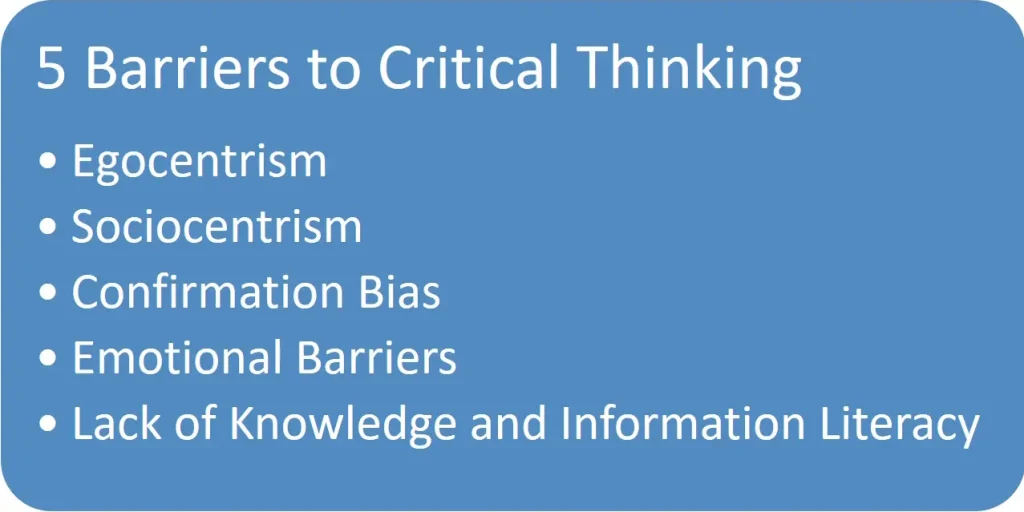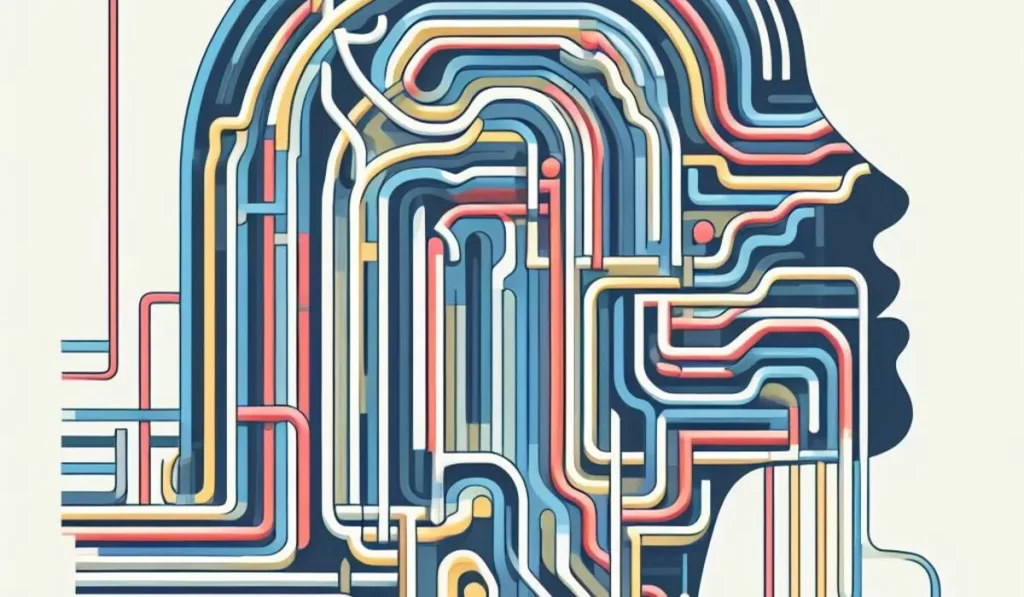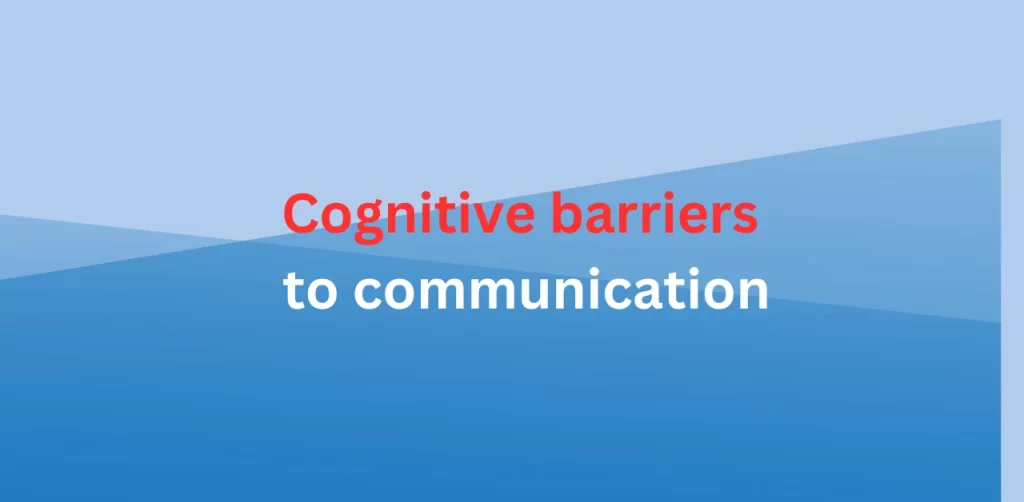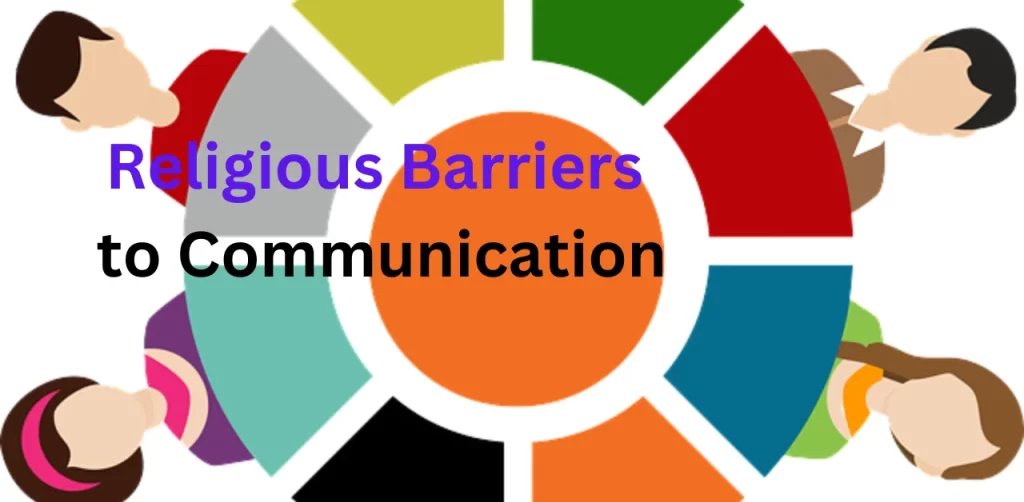Critical thinking is like a superpower in our brains, helping us make smart choices and solve tricky problems. But sometimes, invisible obstacles can trip us up, making it tough to think clearly and wisely. Imagine you’re on a treasure hunt, but there are hidden traps along the way – these are the barriers to critical thinking.
Barriers to critical thinking include cognitive biases and emotional reasoning, hindering objective analysis and problem-solving. Overreliance on tradition and social conditioning can also impede open-mindedness and rational inquiry.
They can be sneaky, like when we only listen to ideas that we already like or when we’re too scared to try new things because we might make mistakes. Sometimes, we might find ourselves just going along with what everyone else thinks, even if, deep down, we’re not sure it’s right. It’s like trying to see through a foggy window – we know there’s more out there, but it’s hard to see clearly.
Contents
5 Barriers to Critical Thinking
Despite its importance, several barriers can hinder individuals from thinking critically. Here are five significant barriers to critical thinking:

Egocentrism
This is the tendency to see everything in relation to oneself and to prioritize one’s own opinions, needs, and views over those of others. Egocentrism can lead to a lack of objectivity, making it difficult to consider other perspectives or evaluate evidence that contradicts personal beliefs.
Sociocentrism
Similar to egocentrism but on a group level, sociocentrism involves prioritizing the norms, values, and beliefs of one’s own group (e.g., cultural, social, or familial groups) without considering wider perspectives. This can lead to groupthink, where the desire for harmony or conformity in the group results in an irrational or dysfunctional decision-making outcome.
Confirmation Bias
This is the tendency to search for, interpret, favor, and recall information in a way that confirms one’s preexisting beliefs or hypotheses. It leads individuals to give greater emphasis to evidence that supports their existing opinions, while disregarding or rationalizing disconfirming evidence.
Emotional Barriers
Strong emotions can cloud judgment and impact the ability to think critically. For instance, fear, anger, or frustration can influence decision-making processes and lead to impulsive reactions or decisions based on emotions rather than facts.
Lack of Knowledge and Information Literacy
To think critically, one must have a base of relevant knowledge and the ability to acquire, evaluate, and utilize information effectively. Without sufficient knowledge on a topic, it becomes challenging to assess the validity of arguments or evidence. Similarly, lacking information literacy skills can make it difficult to discern credible sources from unreliable ones.
Overcoming Barriers to Critical Thinking
Developing Awareness and Mindfulness
The first step to overcoming barriers to critical thinking is to develop an awareness of these barriers. Paying attention to what’s influencing our thought processes allows us to recognize and address our biases and fears.
Embracing Uncertainty and Change
Embracing uncertainty and change is crucial in overcoming fear of failure and normalcy bias. This involves accepting that we don’t always know the answers and being open to new ways of seeing and doing things.
Enhancing Information Analysis Skills
Good critical thinking requires the ability to analyse and evaluate information effectively. This involves taking the time to analyse facts and data, considering the advantages and disadvantages of different perspectives, and developing a solution based on sound reasoning.
Fostering an Environment of Openness and Diversity
Creating an environment where everyone feels comfortable expressing their ideas and opinions is vital for overcoming groupthink. This encourages diversity of thought and promotes strategic thinking, leading to more innovative and effective solutions.
Applying Critical Thinking in Everyday Life
In Personal and Professional Life
Critical thinking is not just a professional skill but also a valuable tool in our personal lives. By using critical thinking in our personal and professional lives, we can make better decisions, solve problems more effectively, and improve our overall growth and development.
Decision-Making and Problem-Solving
The ability to think critically is fundamental in the decision-making process. It helps us evaluate the situation, consider different perspectives, and choose the most effective way to solve a problem.
Strategic Thinking and Planning
Strategic thinking, a soft skill closely related to critical thinking, involves planning for the future by considering various scenarios and outcomes. This type of thinking is essential for long-term success and sustainability in both personal and professional realms.
Conclusion: The Path to Better Thinking
Overcoming barriers to critical thinking may seem difficult, but it is an achievable goal. By being aware of the barriers, actively working to mitigate their effects, and continuously practicing and applying critical thinking strategies, we can enhance our thinking abilities. This not only leads to better decision-making and problem-solving but also contributes significantly to the development of a person’s character and life. Let’s strive to overcome these barriers and harness the full power of critical thinking for our personal and professional success.


